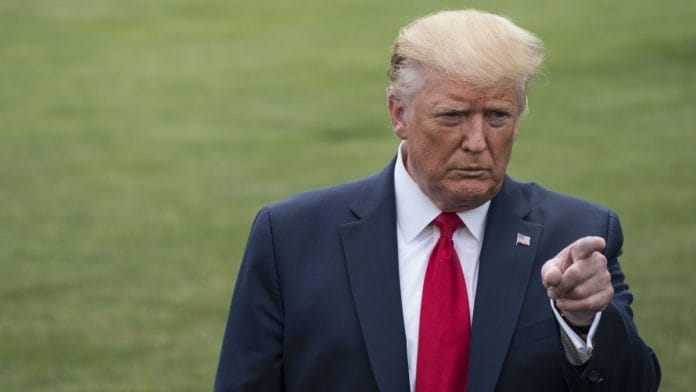Washington: President Donald Trump said there’s a chance the Middle East peace plan he plans to release on Tuesday — after three years in development — wins the support of Palestinians and Arab nations but that he can live with its rejection.
“We’re going to show a plan that’s been worked on by everybody,” Trump said Monday at the White House, alongside Israeli Prime Minister Benjamin Netanyahu. “And we’ll see whether or not it catches hold. If it does, that would be great. And if it doesn’t, we can live with that too, but I think we might have a chance.”
Trump made the comments as he opened meetings with Netanyahu to discuss the long-promised peace plan, with both leaders using the talks to deflect from domestic challenges to their political survival.
Netanyahu’s political rival Benny Gantz also visited the White House on Monday to discuss the plan that Trump said he will release at noon Washington time on Tuesday. The meetings come as Trump’s lawyers present their defense in the Senate against removing him from office and as Netanyahu’s request for legal immunity from three separate corruption trials is up for a parliamentary vote in Jerusalem.
Netanyahu said before boarding a plane to Washington on Sunday that he’s going to “make history” with Trump, though Palestinian leaders and political analysts have condemned the president’s plan as futile. Trump, who said Netanyahu supports his plan, told reporters on Monday that there’s a good chance Palestinians will come around eventually.
Also read: From Modi to Imran Khan, Trump’s visit to Delhi holds a victory for all sides
‘Overly Good’
“They probably won’t want it initially, but I think in the end they will,” he said. “I think in the end they’re going to want it. It’s very good for them. In fact, it’s overly good to them, so we’ll see what happens.”
He also asserted that “many of the Arab nations have agreed to it — they like it, they think it’s great, they think it’s a big start, too.” He said, “I think it’s a fantastic thing if we can pull it off.”
Trump is widely expected to produce a solution that is favorable to Israel over the Palestinians, which may help him shore up the backing of evangelical Christians, who are stalwart defenders of Israel, as well as conservative Jewish contributors for his re-election bid in November.
Netanyahu has just over a month to finally convince Israeli voters that despite his legal predicament, he’s the superior choice over top rival Gantz, the former military chief who has battled the Israeli leader to a draw in two consecutive elections. Gantz has started to appeal to right-wing voters in his effort to unseat Netanyahu.
The Israeli prime minister has touted his close ties to Trump, who has furthered Israeli interests. Netanyahu praised Trump on Tuesday for his combative stance toward the Iranian government, whose policies Netanyahu has long described as posing an existential threat to his country.
While reporters were ushered into the Oval Office to see Trump and Netanyahu exchange praise of one another, Gantz came and went without fanfare.
Gantz told reporters later Monday that Trump’s plan is a “significant and historic milestone” and as prime minister he would “work toward implementing it from within a stable, functioning Israeli government, in tandem with other countries in our region.”
According to the latest polls, Netanyahu’s Likud party trails Gantz’s Blue and White bloc, though neither man has enough support to form a majority government and break Israel’s political stalemate.
Talk about Trump’s peace plan has drowned out what has been until now the focus of the past two Israeli elections — Netanyahu’s corruption trials. Gantz said he was flying back to Israel for a debate on the immunity proposal on Tuesday.
“No one has the right to lead a country with such diplomatic and security concerns, when all his thoughts and actions are subject to personal interests,” Gantz said. “Netanyahu can’t run a country and at the same time deal with a trial.”
Politically, Gantz may have had little choice but to come to Washington for meetings where he’s sure to be upstaged by Netanyahu. Otherwise, he could be perceived as rejecting what Netanyahu has called a historic opportunity to widen Israel’s borders with strong U.S. backing.
Palestinian leaders will be conspicuously absent from the White House meetings. They have spurned talks with the Trump administration, citing what they have called a series of moves showing favor toward Israel. Those include moving the U.S. embassy to Jerusalem, recognizing Israeli sovereignty over the Golan Heights and proclaiming that Israeli settlements in the West Bank aren’t necessarily illegal.
Nabil Abu Rudeina, a spokesman for the Palestinian Authority president, said in a statement that ambassadors from Arab and Muslim states refused invitations to a White House ceremony on Tuesday to present a plan he called “a conspiracy aimed at undermining the rights of our Palestinian people and thwarting the establishment of the State of Palestine with East Jerusalem as its capital.”- Bloomberg
Also read: India can’t continue to overlook Trump’s diplomatic slights. Time to redefine ties sensibly






